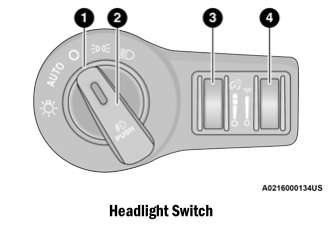Dodge Charger: STARTING AND OPERATING / ENGINE BREAK-IN RECOMMENDATIONS — 3.6L & 5.7L
A long break-in period is not required for the drivetrain (engine, transmission, clutch, and rear axle) in your new vehicle.
Drive moderately during the first 300 miles (500 km). After the initial 60 miles (100 km), speeds up to 50 or 55 mph (80 or 90 km/h) are desirable.
While cruising, brief full-throttle acceleration within the limits of local traffic laws contributes to a good break-in. However, wide-open throttle acceleration in low gear can be detrimental and should be avoided.
The engine oil, transmission fluid, and axle lubricant installed at the factory is high-quality and energy-conserving. Oil, fluid, and lubricant changes should be consistent with anticipated climate and conditions under which vehicle operations will occur. For the recommended viscosity and quality grades.
CAUTION!
Never use Non-Detergent Oil or Straight Mineral Oil in the engine or damage may result.
NOTE:
A new engine may consume some oil during its first few thousand miles (kilometers) of opera- tion. This should be considered a normal part of the break-in and not interpreted as an indica- tion of difficulty. Please check your oil level with the engine oil indicator often during the break in period. Add oil as required.
 ENGINE BLOCK HEATER — IF EQUIPPED
ENGINE BLOCK HEATER — IF EQUIPPED
The engine block heater warms the engine, and permits quicker starts in cold
weather. Connect the cord to a standard 110-115 Volt AC electrical outlet with a
grounded, three-wire extension cord...
 PARKING BRAKE
PARKING BRAKE
Before leaving the vehicle, make sure that the parking brake is fully applied
and place the gear selector in the PARK position.
The foot operated parking brake is located below the lower left corner of the
instrument panel...
Other information:
Dodge Charger 2011-2026 Owner's Manual: Types of Media Modes
USB Mode Overview USB Mode is entered by either inserting a USB device into the USB port or by selecting the USB button on the left side of the touchscreen, or the Source Select/Select Source button and then selecting USB 1 or 2 (if equipped). Bluetooth® Mode Overview Bluetooth® Streaming Audio or Bluetooth® Mode is entered by pairing a Bluetooth® device, containing music, to the Uconnect system...
Dodge Charger 2011-2026 Owner's Manual: Manual Front Seat Forward/Rearward Adjustment
Some models may be equipped with a manual front passenger seat. The seat can be adjusted forward or rearward by using a bar located by the front of the seat cushion, near the floor. While sitting in the seat, lift up on the bar located under the seat cushion and move the seat forward or rearward...
Categories
- Manuals Home
- Dodge Charger Owners Manual
- Dodge Charger Service Manual
- USB/AUX Control
- To Lock/Unlock The Doors And Trunk
- Headlight Switch
- New on site
- Most important about car
Headlight Switch
The headlight switch is located on the left side of the instrument panel. This switch controls the operation of the headlights, parking lights, instrument panel lights, and fog lights (if equipped).

